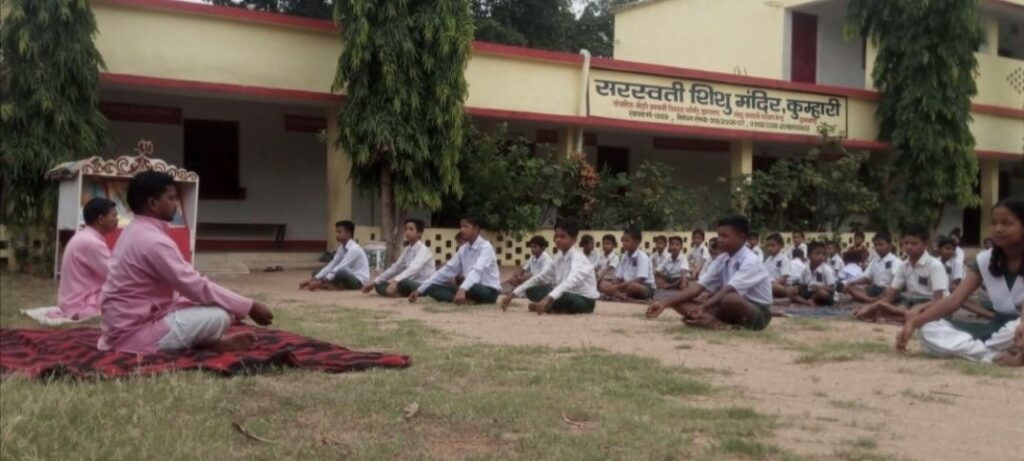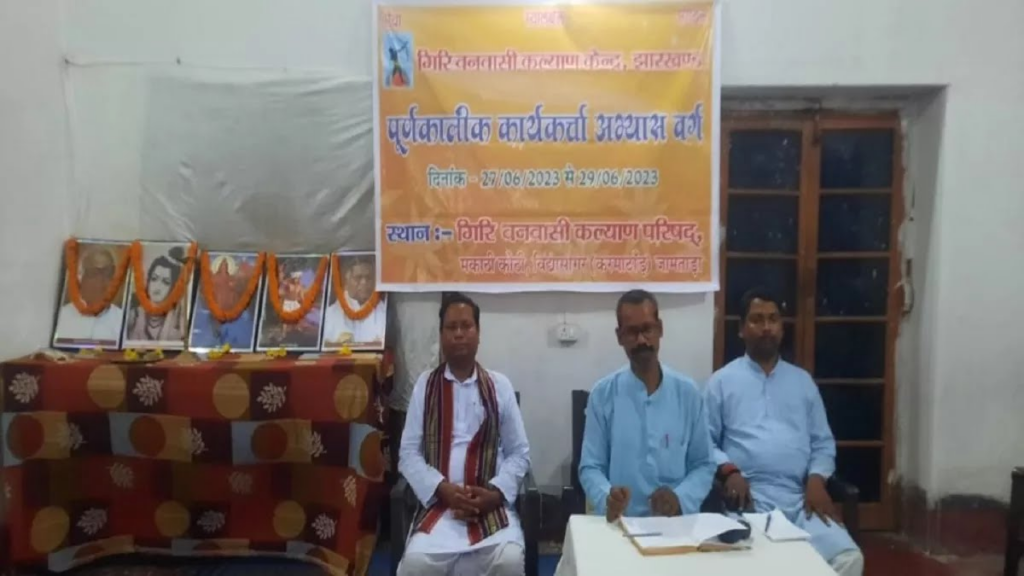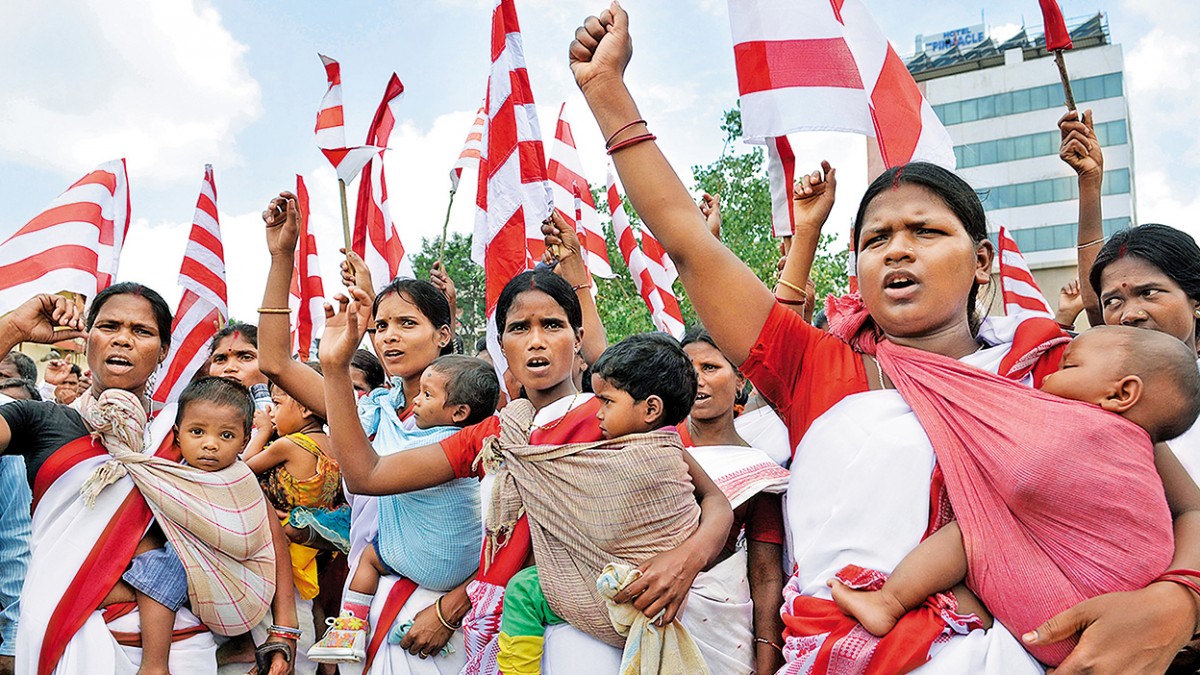Unlike the usual celebrations of World Tribal Day in Madhya Pradesh on August 9, this year saw tribal communities voice their dissent through protests. Various these tribal outfits united in opposition against a number of issues: the persistent violence targeting the Adivasi community in Manipur, the contentious Forest Conservation Amendment Bill of 2023, and the controversial decision by the Chief Minister to include the Keer community in the Scheduled Tribe list. This incident serves as reminder that the demand for tribal rights needs to come centre-stage.
“The Centre as well as state government is constantly attacking the essence of the Constitution. They are tweaking laws to get absolute power. Secularism is under threat and there are attempts to make India a Hindu Rashtra,” says Bhaiyalal Kunjam, a tribal community member.
In the vast geography of India’s diverse society, the Adivasis, or Scheduled Tribes, have long grappled with marginalisation. Historically side-lined by the caste system, Adivasis have found themselves cast outside the Brahminical caste order, having been deemed entirely impure. Their distinct identity, traditions and cultures has set them apart from the majority Hindu population and other organised religious groups, although tribal populations have immense diversity of religions among them too.
The Constitution of India officially designates them as Scheduled Tribe(s). However, many Adivasis refer to themselves as ‘Adivasi,’ to express their status as the ‘first inhabitants.’ The Supreme Court of India has also acknowledged their status as “the original inhabitants” in a landmark 2011 order.
Indigenous communities continue to face systematic alienation from their lands and resources, all in the name of “progress” and “development.” According to the 2011 Census, Adivasis constitute about 104 million of India’s population. Yet, their socioeconomic condition remains abysmal. Alarming statistics reveal that a significant portion, 47.3%, of the Scheduled Tribe population lives below the poverty line, which is set at a meagre Rs. 356 per month per capita consumption expenditure, as reported in the 11th Five Year Plan by the Planning Commission of India in 2008.
Despite constitutional safeguards, such as reserved seats in the Lok Sabha and a 7.5% quota in government jobs, fair representation remains elusive. A government report revealed that only 6.18% of employees across 19 Union ministries belonged to STs revealing the significant gap in actual representation. While overall literacy among Adivasis lagging far behind the national average by 14 percentage points. However states like Nagaland, Mizoram, and Meghalaya boast higher literacy rates among STs compared to the non-tribal population.
Despite the staggering socio-economic indexes, the traditional lifestyle adopted by indigenous communities is in harmony with nature, practising sustainable biodiversity utilisation. However, since India’s independence in 1947, over 30 million Adivasis have been forcibly displaced in the name of development projects, including mining, dams, and highways, often under the pretext of conservation. Despite being a romanticised category, basic human and fundamental rights have been denied them.
What’s in a name: the RSS’ attempts at ‘Ghar Wapsi’
The battle over terminology adds another layer to their struggle, as it reveals a disturbing picture of a power struggle by the supremacist RSS and its various wings over the indigenous. The organisation has distinctly (alternately tried to impose) used the term Vanvasi for the group. The distinction between the popular term ‘Adivasi’ that signifies their original status as indigenous to India, whereas ‘Vanvasi’ (literally, forest dweller) has been advocated by the RSS, in its project to Hinduise (read Brahmanise) Adivasis, who predominantly follow animist or other localised cultures.
According to Ram Puniyani, this debate carries deeper political implications for the RSS argues that references to ‘Vanvasi’ in ancient Indian texts signify then as forest dwellers, restricted to the forest. Whereas, the term Adivasi designates them as original inhabitants, putting other communities, including upper castes, as immigrants to the land – a claim that would certainly cause a severe dent into the RSS’ ideology. Recently, Congress leader Rahul Gandhi has criticised this and has asserted that calling them ‘Vanvasis’ denies tribals their rightful identity as ‘Adivasis,’ the original inhabitants and true owners of India.
The Sangh Parivar and its Hindu nationalist network, actively seeks to influence Adivasis’ lives. Their aim seems to be to ‘bring back’ tribals into the fold of Hinduism through various means, from ideological influence by a number of organisations like Vanvasi Kalyan Ashram and Ekal Vidyalaya.
RSS’s initiatives with tribals on the ground
A piece by Sabrang India further notes how one such RSS-affiliiate the Akhil Bharatiya Vanvasi Kalyan has been working since the 1950s. The organisation mentions on its website that it is a non-profit organisation with a primary goal of “bridging the gap between the Hindu community and their Vanvasi counterparts” with love and goodwill and fostering a sense of belonging among Vanvasis. The organisation cites the presence of tribals in Hindu religious texts, citing references in the Ramayana and Mahabhiggyrata, such as Shabari, Baali, Sugreev, Eklavya, Barbarik, and Ghatotkacha.

VKA’s core visions include social assimilation to “bridge the divide between the mainstream Indian community and tribal brethren”. They also aim to counter the influence of Christian Missionary schools among tribals. Founded in 1952 in Madhya Pradesh, VKA has expanded its presence to every state with a tribal population since 1978. What makes it even clearer is the organisation’s inauguration is attributed to then RSS chief MS Golwalker.
Furthermore, the organisation is associated with Ekal Bal Vidyalaya schools, as per its website. The Ekal Vidyalaya Foundation of the USA is directly linked to the RSS, received loans totalling $70,000, according to the International Policy Digest.
A 2009 committee report commissioned by India’s Ministry of Human Resource Development alleged that Ekal Vidyalaya-run schools in India primarily focused on promoting communal disharmony and propagating a fundamentalist political ideology, contributing to religious tensions among communities.
According to The Print, the Akhil Bharatiya Vanvasi Kalyan Ashram has expressed concerns about the increasing number of tribal people identifying themselves as belonging to Other Religions and Persuasions (ORP) during the upcoming 2021 Census in India. They are also worried about the potential conversion of ORP individuals to Christianity.
Currently, many tribal groups in Jharkhand are currently demanding recognition of Sarna religion as a separate religion. According to Outlook India in a report from December 2022, in November 2020, the Jharkhand government held a special Assembly session to pass a resolution recognising the Sarna religion and including it as a distinct category in the 2021 Census. Additionally, the National Commission for Scheduled Tribes (NCST) has also recommended that the Sarna religion be given a separate classification within the religion code for the Census of India.
Furthermore, according the Print, the Vanvasi Kalyan Ashram conducts “awareness programs” or ‘jan jagran’ meetings in major tribal areas across the country, with a particular focus on states with substantial tribal populations like Jharkhand, Chhattisgarh, Maharashtra, Gujarat, Telangana, Andhra Pradesh, West Bengal, Rajasthan, and Odisha. Their aim is to talk about the integral role of tribals within the Hindu religion and counter potential conversion efforts by Christian missionaries and demands for separate recognition of indigenous religious codes.
The organisation also believes that Christian missionaries are attempting to distort stories from Hindu epics like Ramayana and Mahabharata to create divisions and separate tribals from the broader Hindu community.
These ‘Jan Jagran’ programs had been postponed due to the COVID-19 pandemic but were soon revived in preparation for the 2021 Census. The organisation had planned an extensive campaign to inform villagers about supposed “deceptive plans by Christian missionaries” and aims to prevent the tribal community from being disconnected from the broader Hindu religion, and hereby continuing to spread hate against minorities in indigenous communities.
Twitter account of Vanvasi Kalyan Kendra sharing a photo which incorporates several South Asian countries within one country.
— Vanvasi Kalyan Kendra, Jharkhand (@KendraKalyan) August 31, 2023
According to Jagaran, a programme was organised as recently as June 2023. “People who have converted to Christianity and Islam from the tribal society are still benefiting from being tribals, and their numbers are up to about 80 percent.” Such discussions took place at the three-day programme for grassroots workers at the Giri Vanvasi Kalyan Kendra in Jamtara, at which the National Co-Coordinator of the Janjati Suraksha Manch also said that by converting to Islam and Christianity, these people are usurping the rights of tribals. Thereby, it is to be of note that while the discourse on Vanvasi revolves around often about being Indian and following Indic culture and if pledging unity to the nation, a distinct anti-minority stance is also taken in the propagation of these values. The Janajati Suraksha Manch is known to be an RSS affiliate, and has been campaigning for delisting of converted tribals from the Scheduled Tribes reservation benefits for quite a while now.

Earlier last month in August, a video surfaced on the internet Vishwa Hindu Parishad (VHP) leader Alok Kumar gave a hate speech at an event organised by Vanvasi Raksha Parivaar Foundation. He demonised minorities and spoke about converting mosque to temples in his hate-laced speech.
Location: New Delhi
Vishwa Hindu Parishad (VHP) working president Alok Kumar delivered a communal speech demonizing Muslims and claimed mosques in Mathura and Varanasi would be converted into temples in the next ten years.
Kumar was speaking at an event organized by Vanvasi… pic.twitter.com/nTtayORGPb
— HindutvaWatch (@HindutvaWatchIn) August 14, 2023
Opposition to RSS
However, these attempts by RSS have not gone unopposed by tribal groups. Several tribal organisations have opposed the demands for delisting converted tribals from reservation benefits, according to Economic Times. Tribal groups have also vehemently opposed being included within the Hindu religion.
It is our right to demand adivasi religion colum census 2021. And we are not Vanvasi, we are adivasi. we are indigenous people of india. implement tribal religion colum. #आदिवासी_मूलनिवासी_है pic.twitter.com/t4jZ4ArDzn
— Tribal Army (@TribalArmy) June 19, 2021
Acclaimed academic Virginius Xaxa in a paper titled “Transformation of Tribes in India: Terms of Discourse,” observes that even when tribes undergo Hinduisation, they maintain a unique identity and often exist outside the Hindu caste structure. He explains that, in practice, tribes generally remain detached from the hierarchical structure of Hindu society. Any claims they make regarding Hindu affiliation usually occur after they integrate into the larger social framework of neighbouring Hindu and linguistic communities. Xaxa suggests that it is theoretically possible for individuals to adopt the Hindu faith and practices without becoming part of Hindu society in the caste-based sense. In his paper, Xaxa also astutely asks does acquiring another religion means that one let’s go of belonging to a tribal community.
However, despite attempts by several institutions, India’s Adivasis (tribal population) continues to remain vulnerable to hate crimes. According to a report by CJP, there was a 6% increase in Atrocities/Crimes against Scheduled Tribes in 2021, totalling 8,802 cases, compared to 8,272 cases in 2020. Madhya Pradesh recorded the highest number of cases at 2,627, making up 29% of the total, followed by Rajasthan with 24% (2,121 cases) and Odisha with 7% (676 cases) in 2021. Maharashtra followed closely with 7% (628 cases), and Telangana reported 5% (512 cases).
These top five states made up for about 74% of all reported cases of atrocities against Scheduled Tribes. What is even alarming is that the National Commission for Scheduled Tribes has reported despite the number of cases of atrocities rising, the number of cases dealt by the NCST have reduced.
For instance, according to Sabrang India, the total number of cases that had been dealt with during the 2019-2020 period were 1558, which reduced to 533 during the 2020-2021 period, marking a drastic reduction.
So, while the RSS and its counterparts only seek to dominate discourse around India’s Adivasis with bogies of conversion conspiracies” by Christians or Muslims, what this painfully shrouds, or conceals, is the widespread and systemic violence and discrimination experienced by all tribal communities in India.
Related:
Why Adivasis Didn’t Celebrate World Tribal Day This Year in Poll-Bound Madhya Pradesh
RSS-linked organisations invited for seminar at IIT, senior officials at TRIFED decry move
Tribals in a Jharkhand village denied access to drinking water from the common well
Mudumalai Tiger Reserve: Adivasis Cheated out of Forest Land, Compensation

